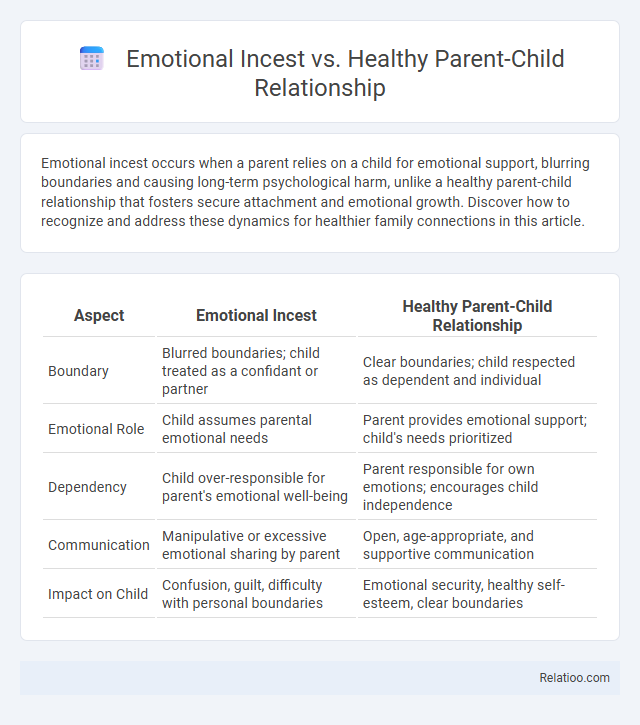Emotional incest occurs when a parent relies on a child for emotional support, blurring boundaries and causing long-term psychological harm, unlike a healthy parent-child relationship that fosters secure attachment and emotional growth. Discover how to recognize and address these dynamics for healthier family connections in this article.
Table of Comparison
| Aspect | Emotional Incest | Healthy Parent-Child Relationship |
|---|---|---|
| Boundary | Blurred boundaries; child treated as a confidant or partner | Clear boundaries; child respected as dependent and individual |
| Emotional Role | Child assumes parental emotional needs | Parent provides emotional support; child's needs prioritized |
| Dependency | Child over-responsible for parent's emotional well-being | Parent responsible for own emotions; encourages child independence |
| Communication | Manipulative or excessive emotional sharing by parent | Open, age-appropriate, and supportive communication |
| Impact on Child | Confusion, guilt, difficulty with personal boundaries | Emotional security, healthy self-esteem, clear boundaries |
Understanding Emotional Incest: Definition and Signs
Emotional incest occurs when a parent relies on a child for emotional support and intimacy typically reserved for adult relationships, leading to blurred boundaries and unhealthy parent-child dynamics. Key signs include the child feeling responsible for the parent's emotional well-being, experiencing guilt or pressure, and lacking appropriate parental guidance. Unlike a healthy parent-child relationship that maintains clear boundaries and nurtures child development, emotional incest constitutes a boundary violation that compromises the child's psychological health.
What Constitutes a Healthy Parent-Child Relationship
A healthy parent-child relationship is characterized by clear emotional boundaries, mutual respect, and appropriate nurturing that supports the child's autonomy and development. Emotional incest occurs when parents seek emotional support from their child or rely on them for adult companionship, blurring these boundaries and causing role reversals. Boundary violations range from subtle intrusions to overt interference, impeding the child's ability to form a secure sense of self and maintain independent emotional functioning.
Emotional Incest: Common Behaviors and Patterns
Emotional incest involves a parent relying on a child for emotional support or intimacy typically reserved for adult relationships, often leading to blurred boundaries and role confusion. Common behaviors include excessive disclosure of adult problems, seeking emotional validation from the child, and neglecting the child's developmental needs by treating them as a surrogate partner. Distinct from healthy parent-child relationships where boundaries and roles are clear, emotional incest violates personal boundaries, causing long-term emotional and psychological impacts.
Boundaries: Key Differences in Healthy Relationships
Healthy parent-child relationships maintain clear emotional boundaries, allowing children to develop autonomy and emotional security without undue burden. Emotional incest blurs these boundaries by imposing parental emotional needs onto the child, leading to role confusion and long-term psychological harm. Boundary violation occurs when boundaries are ignored or crossed in ways that undermine respect and trust, whereas healthy relationships prioritize mutual respect and appropriate emotional distance to support your well-being.
Emotional Burden and Parentification Explained
Emotional incest involves a parent relying on their child for emotional support, creating an unhealthy parent-child relationship marked by role reversal and emotional burden on the child. Healthy parent-child relationships maintain clear boundaries, where parents provide guidance without imposing adult responsibilities, preventing parentification. Boundary violations blur these lines, causing the child to take on caregiving roles prematurely, impacting Your emotional well-being and development.
Impact of Emotional Incest on Child Development
Emotional incest occurs when a parent relies on a child for emotional support or companionship inappropriately, leading to blurred boundaries and role confusion, which can cause difficulty in forming healthy adult relationships and lower self-esteem. In contrast, a healthy parent-child relationship maintains clear emotional boundaries, fostering secure attachment, appropriate independence, and emotional regulation. Boundary violations, such as emotional incest, disrupt the child's development by impairing their ability to differentiate their own needs from their parent's, often resulting in long-term psychological distress and relational challenges.
Healthy Emotional Support vs. Unhealthy Dependence
Healthy emotional support in a parent-child relationship fosters independence and resilience by nurturing open communication, empathy, and appropriate emotional boundaries. Emotional incest occurs when a parent seeks emotional support from the child, causing unhealthy dependence that blurs roles and places undue psychological burden on Your wellbeing. Boundary violations manifest when personal limits are ignored, leading to confusion between support and control, which undermines the child's ability to develop a secure, autonomous identity.
Recognizing Red Flags in Parent-Child Dynamics
Emotional incest occurs when a parent relies on a child for emotional support inappropriately, blurring familial boundaries and causing confusion in the child's role. Healthy parent-child relationships maintain clear emotional and physical boundaries, fostering trust, security, and age-appropriate interactions. Boundary violations manifest as controlling behaviors, inappropriate disclosures, or neglecting the child's autonomy, signaling red flags that may lead to psychological harm or attachment issues.
Steps to Foster Healthy Parent-Child Boundaries
Establishing clear boundaries between you and your child involves consistent communication, respect for individuality, and emotional support without role reversal. Encouraging your child's independence while maintaining appropriate parental authority helps prevent emotional incest and protects the integrity of a healthy parent-child relationship. Setting limits on emotional reliance and seeking professional guidance when boundary violations occur are crucial steps to ensure a balanced and nurturing family dynamic.
Healing from Emotional Incest: Support and Resources
Healing from emotional incest involves recognizing the blurred boundaries where a parent seeks emotional fulfillment from their child, unlike a healthy parent-child relationship based on mutual respect and appropriate emotional roles. Your recovery thrives on therapy approaches such as family counseling, trauma-informed therapy, and support groups that focus on establishing healthy boundaries and rebuilding self-identity. Resources including licensed mental health professionals, books on family dynamics, and online communities provide essential guidance to navigate emotional healing and foster resilience.

Infographic: Emotional Incest vs Healthy Parent-Child Relationship
 relatioo.com
relatioo.com